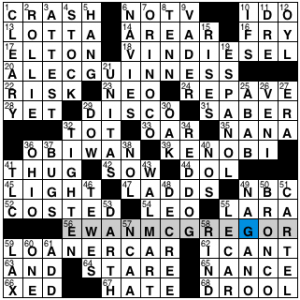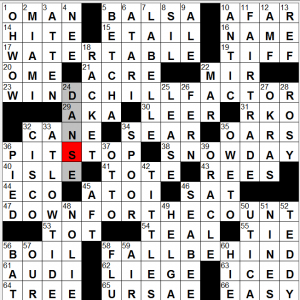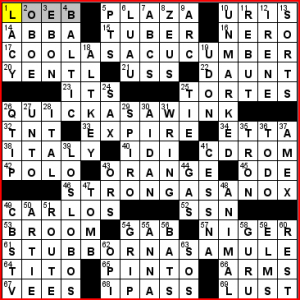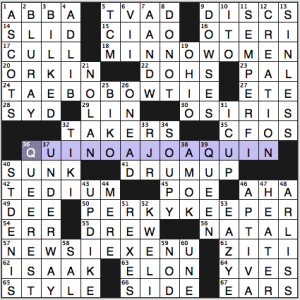NYT 3:44
LAT 3:17 (Jeffrey)
CS 5:35 (Sam)
Onion untimed
Eric Williams’s New York Times crossword
Remember Frank Costanza’s Festivus airing of grievances speech, beginning with “I got a lot of problems with you people”? (It’s a Seinfeld reference.) Over the years I have come up with a cutoff for the number of names and other proper nouns in a crossword, a limit beyond which a lot of solvers will feel overtaxed. That number is 14. This puzzle, not counting the theme answers, hit the 20 mark. The puzzle marked its territory right off the bat—1d and 2d, CLEARY and ROLLIE, cross two capitalized title words, two people’s names, one game name, and just one lowercase word. Why make CRASH a title here? Why clue LOTTA with some 1978 song I have zero memory of, despite being a radio-obsessed 12-year-old then? (Edited to add: Wait! I know that song! The singer wasn’t ringing much of a bell. It’s the one that starts, “It’s gonna take a lotta love.” Duh.)
I suspect those 9-letter fill answers will also throw some solvers out of whack, as VIN DIESEL and LOANER CAR (themselves good entries) look like theme answers more than the four 5-letter theme answers (LIGHT, SABER, DARTH, VADER) do.
The rest of the theme hinges on the coincidence that the two actors who’ve played OBI-WAN KENOBI have names of equal length: ALEC GUINNESS and EWAN MCGREGOR. It might’ve been nice, a constructor friend suggests, to stretch the grid to 16 squares wide so that OBIWANKENOBI could be a single entry, and to make room for LIGHTSABER and DARTHVADER as 10s instead of split 5s.
Deadliest crossing: Square 47. 38d [__ pros. (court record abbr.)] clues legalese abbrev NOL, and 47a [Father-and-son Hollywood duo] clues LADDS. What the …? There’s Alan Ladd and … I got nothin’. Not Cheryl Ladd, not Diane Ladd. I think, after consulting the estimable Herr Doktor Professor Google, that the “and son” refers to David Ladd, who was married to Cheryl Ladd. Um, he isn’t famous. Alan, who died in 1964, was famous. Horrendous crossing here.
Least familiar answer for m: 34d RED DOG, [Blitz, in football]. Never heard the term, which crosses four proper names (including the aforementioned LADDS) and the [Currency board abbr.] DOL. Tough spot for non-football fans.
Most assertively Only in Crosswords answer: 14a AREAR, [To the back]. The Merriam-Webster Collegiate Dictionary doesn’t even list the word.
This wasn’t a puzzle I enjoyed solving. Two stars from me.
Jack McInturff’s Los Angeles Times crossword – Jeffrey’s review
Theme answers:
- 17A. [*It’s lower during dry seasons] – WATER TABLE. Don’t go chasing waterfalls. Just sayin’.
- 23A. [*Index that measures skin sensation] – WIND CHILL FACTOR. A lottery win in Canada is considered a windfall and is completely taxfree. If I win the lottery I would be able to quit this blogging job.
- 36A. [*Road trip respite] – PIT STOP. The odds of winning the lottery create a pitfall in my plan.
- 38A. [*Winter storm respite for some] – SNOW DAY. A snowfall is the falling of snow from the sky.
- 47A. [*Knocked loopy] – DOWN FOR THE COUNT. Downfall is the falling of down from the sky.
- 58A. [Lag, and a hint to what the starts of the answers to starred clues have in common] – FALL BEHIND. A behind fall is better known as a pratfall.
Other stuff:
- 20A. [Cockney abode] – ‘OME. I can be very forgiving in the fill department but I really, really ‘ate ‘OME!
- 7D. [Two-time Grammy winner Patti] – LABELLE
- 11D. [Movement to promote equitable commerce] – FAIR TRADE. I’ll trade you Expo ’67 for a World’s Fair to be named later.
- 32D. [Kid in Westerns] – CISCO
Patrick Blindauer’s CrosSynergy/Washington Post crossword, “Some Similes” – Sam Donaldson’s review
I’m as happy as a clam that I got through this puzzle in relatively short order, despite feeling as a sick as a dog (well, it’s just allergies, but I’m working with the theme here). The theme entries are all similes:
- 17-Across: [Simile #1] is COOL AS A CUCUMBER. Frankly, cucumbers are somewhat nerdy, as vegetables go. They’re not nearly as cool as the carrots and asparagus.
- 26-Across: [Simile #2] is QUICK AS A WINK. “Quick as a flash” is slower. But “Quick as The Flash” is considerably faster.
- 46-Across: [Simile #3] is STRONG AS AN OX.
- 61-Across: [Simile #4] is STUBBORN AS A MULE. I’ve heard that comparison on more than one occasion.
The four similes are both familiar and lively. I get the funny feeling I’m missing some extra layer to this theme, however. It’s not the first time I would be as blind as a bat, but after looking for some link between “cool,” “quick,” “strong,” and “stubborn,” and then for some connection between “cucumber,” “wink,” “ox,” and “mule,” I just don’t see it. I’ll feel as a mad as a hatter if there’s something else to the theme.
I’ve never heard of OPI, the [Nail polish brand with a color called Lincoln Park After Dark]. Its website lists all the available shades–my favorite is “A Good Man-darin is Hard to Find,” though “Teal the Cows Come Home” is pretty too.
Favorite entry = LOS LOBOS, the [“La Bamba” band], though ALT KEY has a nice quirkiness to it. Favorite clue = [Witch craft?] for BROOM, with an honorable mention to [Muppet drummer] as the clue for ANIMAL.
Ben Tausig’s Onion A.V. Club crossword
1a: ABBA ties the theme together: The five theme entries are made by pairing two-syllable words whose halves sound alike, in an AB/BA pattern.
- 18a. MINNOW OMEN, [Small dead fish left in someone’s bed?]. I want the syllables of “minnow” to flip to “now-mih” but that certainly didn’t occur to me while solving.
- 24a. TAE BO BOWTIE, [Formalwear worn in a ’90s workout video?].
- 36a. QUINOA JOAQUIN, [Nutritious grain à la Phoenix?]. Nice find! Two Qs, nice and Scrabbly.
- 50a. PERKY KEEPER, [Goalie with a bounce in his step?].
- 57a. NEWSIE XENU, [Ancient Scientology dictator selling papers on the street?]. Ha! The least expected syllable swap.
Nice open corners in the grid, plus plenty of fun bits scattered throughout:
- 31d. ICUP, [“Word” spelled aloud by naive third graders]. As in “I see you pee,” titter giggle snort.
- 39d. QUEEN, [Mercury group]. Not the element or the car, but Freddie Mercury.
- 49a. [Grammy winner Kool Moe ___] DEE. A far better clue than the daily papers’ [Barely passing grade]. Nobody gets a “dee” on their report card. EAZY E and Talib KWELI also drop in.
- 11d. SEMPER FI, [Marine’s motto]. Terrific entry.
Gotta run now. 4.5 stars from me, mostly for the freshness of the theme and its execution.




“Red dog” hasn’t been used much in recent decades; it dates from the Sam Huff era which I guess is late fifties.
Crossing Hollywood names gets an automatic one star in my book. There’s no way to reason out the crossing letters if they’re not obvious, which seemed to be the case with someone named EWEN crossing someone named TEWES. I guessed V and thus didn’t successfully finish a Wednesday.
Art
@Art: Now, I halfway wanted to be Julie the Cruise Director on “Love Boat,” so Lauren TEWES was a gimme for me. But with the original “Star Wars” movie, that “Lotta Love” song, a “Love Boat” star, and “Charlie’s Angels” star Cheryl Ladd’s husband David Ladd, who was on “Fantasy Island,” which was on after “Love Boat” back around 1978–the puzzle seemed to have an unhealthy fixation on 1978.
I wasn’t crazy about the fact that all four corners were closed off except for a narrow passageway in, but I did like the way DARTH and VADER crossed the long themed entries symmetrically. Nice debut, Eric.
I guessed (correctly) the NOL/LADDS crossing, but the top-left corner whammy of CRASH/LOTTA/CLEARY/ROLLIE stymied me. The theme was decent, but the fill suffered in several places, with lots of 3-letter answers.
As a general rule, the Times tends to go 16 wide when there’s a 16-letter theme answer. See Tuesday’s puz, e.g. To suggest a constructor, especially a newcomer, should have widened the grid for 12-letter theme answers is asking a lot. The idea is to get accepted, not give the editor a possible reason for rejection.
That said, the grid did feel kind of blocky, a little bit odd with 3×3 corners mixed with a couple of wide-open corners. But I didn’t think the fill suffered. Mostly it did the job, and there were a few good longer answers. I never felt there were too many names, either. Only one that didn’t ring a bell was Beverly CLEARY, though I’ve heard of the Quimby girls. My blind spot, I think; she seems like a puzzle-worthy name.
The LADDS, I figured, were Alan and Alan, Jr., the son a onetime studio head. Lots of Ladds around Hollywood.
Anyone else raise an eyebrow at 59-A/56-D?
NYT: The symmetry of the two actors would make any constructor’s heart sing! Finished in the top-left… After looking at 1- and 2D, I decided to start somewhere else! Turns out my misremembered answer to 2D “ROLLO”, was quite close! Re LADDS, “Father-in-law daughter-in-law acting duo” doesn’t roll off the tongue quite so well!
Nice, dense LAT, and I enjoyed the two spanners! ATLOWTIDE is arbitrary. SPOOR is a fun word to say. The Afrikaans for railway is “spoorweg” and it’s a cognate believe it or not!
Not sharing the adoration of Star Wars, I thought this was going to be a chore, but it went at Wednesday speed. I didn’t stay with the series long enough for the second actor, but recognizable enough.
I will say that, not taking special pleasure, I was more attuned to the clumsy parts of the grid people mentioned and that nasty crossing. I’d certainly heard of Alan LADD, so it wasn’t a hard guess. Still. Let’s say I neither have major complaints nor take special pleasure in it. Just did it quickly and that was that.
Lotta Love was a really big song. I was 10 when it came out and I remember it. Plus it’s a Neil Young song. He wrote it for Nicolette Larsen and then it was featured on his Live Rust album.
The OED has only one author, two citations for AREAR in the “adverb, phrase” sense as clued, Thomas Carlyle:
1849 “Wind is arear of us.”
1865 “The Saxons dragged heavily arear.”
I filled in “abaft” at first until that VADER fellow sliced it with his……well, you know.
For the record. Since Jim actually tracks the non-square grids, I thought I’d check on what I said last night. Looks like about 25 themed dailies (Mon-Thu) go 16 wide, most of them in the past few years, of which 16 by my count have 16-letter answers. The others generally have some theme element creating a reason for the wider grid. No hard-and-fast rule, always editor’s discretion, but generally you go 16 when the theme needs it.
I’m with Amy on this one, one hundred percent and then some — way too many proper names.
46A: Lauren of “The Love Boat”/TEWES How does Lauren pronounce her last name? (Not a nit — just a question.)
52A: Figured the price of/COSTED C’mon. I hope one of you linguistic experts can explain this one to me.
19D: Univision interviews are conducted in it/ESPANOL Where are the indicators for the foreign word usage in the fill? Shouldn’t the answer more properly be SPANISH?
68A: What a napkin may catch/DROOL What, are we at Xmas dinner with 96-year-old Uncle Festus or is the spread so delicious looking that it’s literally mouth-watering? A chin may catch a drool, or a lap, or a plump belly, or even a full beard, like I have, but isn’t a handkerchief or Kleenex more typical?
What I remember about Nicolette Larson is she had a lotta hair.
As for the “Father-and-son Hollywood duo”, doesn’t “duo” imply actors/directors/producers/etc performing together? Is any father and son a duo? Did the Ladds in question ever perform as a duo?
The Star Wars theme? Hech. Hasn’t it been done to death?
Papa John,
COSTED is indeed stretching it. There are no citations in the OED of it used as an inflected verb as it is here. But, the OED does list “COST” as a “Commerce” term (again, no citations) and refers the reader to the gerund “COSTING” which was apparently much in use in the latter half of the 19th century and early part of the 20th. Example:
1922 “Costing is the collecting, calculating, and allocating the cost of material, labour and the correct proportion of overhead charges involved in a production or utility.”
As I said, more than a bit of a stretch.
Congrats to Eric Williams on his debut!! Apparently, Amy only recognizes her friends.
@Brian V: “”Congratulations! That said, I really didn’t care for your puzzle”? It’s an awkward combo.
I guess I have been spending too much time in the business/contracting world, because “costed” seems completely routine to me. As in Mr. Dithers saying to Dagwood, “have you costed the Grimzlik project yet?” Then steam coming out of his ears when he sees that Dagwood is asleep.
MW11 records costed in this sense, and notes that is often followed by ‘out.’
Thanks, Daniel. Do you use the online OED?
David, how is costed different than priced — if there is a difference?
Papa John,
No, I have it on CD-ROM. I have an old laptop which I use exclusively for the CD.
David L,
Thanks for the Dagwood quote. As has often been pointed out to me, the OED can be a bit stodgy in these matters. I can’t, for example, imagine it citing Mr. Dithers! LOL
Daniel M: I should probably add that my Dagwood “quote” was made-up, although given how long that strip has been running Dithers may well have said something like that. I just meant to illustrate how people use the phrase.
Papa J: If you believe business people, “costing” a project that you’re submitting a bid on means looking at all the steps you would have to perform, figuring labor hours and materials, overhead, fees etc, and so coming up with the price you propose to charge for it.
Whether this is genuinely different from “pricing” a project is debatable. As so often happens in these cases, people in a specialized line of work like to use their own special word, to make it appear that the number they have come up with is the result of deep analysis and intense cogitation, and not some figure they just picked out of thin air to see what they could get away with.
“jargot”
Hmmmmmmmmmmmmm—-Can anyone find a citation – perhaps in a business textbook or something of the sort? – using “TO COST” in the above sense in one of the finite verb’s inflected forms, rather than the gerund “costing”? A regular “Jargotnaut”, it is, pannonica!:-)
Hard to argue with a light saber – fun debut! If only Eric had been able to work in GEORGE MICHAEL BLUTH as his home video light saber action scene.
@Amy: agreed on the excessive proper nouns. Do you add in ORINOCO or other geographic names to your count? Something like OREGON seems like it shouldn’t count, but CLEARY definitely should.
I never said I was consistent. So there.
Well, I liked the NYT, but I’m a sucker for all things Star Wars. I’ve even seen the Trilogy Which Shall Not Be Named many times over, including this past weekend on cable.
The NOL, LADDS, and RED DOG section flummoxed me too. You will never find a more wretched crossing of scum and villainy. We must be cautious.
Daniel,
I love my OED (real paper), but you have to understand its limitations here. These puzzles are American English, and the OED doesn’t always get that right.
Here’s an entry in an abridged, desk-size, but American, dictionary.
my new oxford american has the following under COST:
2 (past and past part. cost-ed) estimate the price of : it is their job to plan and cost a media schedule for the campaign
then again, the same source has no entry for AREAR.
i didn’t mind the puzzle, although perhaps it helped to get CRASH, CLEARY, and ROLLIE immediately. i agree with farmer john that a new constructor is unlikely to go 16-wide. you need to learn to follow the rules before you start breaking them.
loved ben’s onion theme, though i was a little uncertain of the KW_LI/X_NU crossing, even with the phonetic hint from the theme. yikes. guessed it right, though.
Anyone else raise an eyebrow at 59-A/56-D?
jangler, what puzzle are you talking about? none of the four reviewed in this post has both a 59a and a 56d.
Martin,
I’m fully aware, as many others have not been slow to point out to me, that the OED has many limitations when it comes to modern American English. Your link, already mentioned by David L at the end of his first post, still doesn’t offer a citation of its use in the sense in which the puzzle has it!!
But crikey, Martin! You still use the old paper OED. Is it the multivolume behemoth, or the single volume cum magnifying glass over which I was wont to pore ere I acquired the CD-ROM?
Joon,
55-D. LOANER CAR and LE CAR in the Times.
Ah, but of course joon wins the prize!:-) Mirabile dictu, a citation! Thanks, joon!
Daniel,
From my link:
past cost·ed: to estimate or set the cost of
I’m missing the nuance of difference with the clue, “Figured the price of.”
20 volume OED2.
Martin,
I miss the nuance of difference as well. That was a little row between David L and Papa John which, to be frank, I never twigged. It’s that your link didn’t offer an EXAMPLE of its use in that sense of the term. joon did.
I’m truly in awe, Martin!
Then again, joon’s example, ” it is their job to plan and cost a media schedule for the campaign” is more of an infinitive. I mean, it should read “to plan and to cost”. But one can easily just say: “He costed a media schedule for the campaign.” But I still wonder, and probably shall evermore, whether anyone actually used a sentence like that in writing, that one can cite. Oh well, the costs of an over-inquisitive mind!
I’m leary of muddying the waters further since I fear I’m a bit unclear on the goal, but are these helpful?
The project was originally costed at 3 million pounds.
The project has yet to be costed out.
(From the note linked at the earlier dictionary citation.)
And if these are merely more of the same, and not on point, perhaps another explanation of what we’d like to see? Or not.
FYI, the uses Martin cites are very familiar to me. We use “costed” all the time at work.
And, of course, Yoda’s version:
Costed out this project is.
Bingo Martin! The fact that it’s in passive voice matters not. The verb, in the first example, meets the the requirements of being finite and inflected. And as for citations of people actually writing this sort of thing, I just did an Advanced Search on Google Books and returned tonnes of positive results, all in textbooks, mind you. I don’t know why I didn’t think of it earlier. I was going to post an example but assumed readers had grown tired of my banging on about it. Here’s an actual citation from a 2007 Accounting textbook:
“To illustrate how services without beginning or ending work-in-process inventories are costed using a process-costing approach, consider the teeth-cleaning process offered by most dentists.”
Thanks, Martin.
sam, re: OPI color names, a recent jeopardy contestant said in her in-game trebek interview that she blogs about stupid nail polish names. most of them are from OPI. i remember patrick asking around on facebook about OPI, which i’d never heard of before… but it seemed to be pretty well-known to women. seems fine to me now; it’s a major brand. and those are mighty useful letters.
LOL Jeffrey-Costed out indeed!